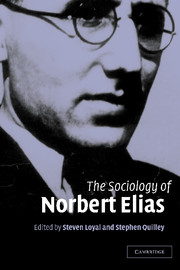Book contents
- Frontmatter
- Contents
- List of contributors
- Acknowledgements
- 1 Towards a ‘central theory’: the scope and relevance of the sociology of Norbert Elias
- Part I Sociology as a human science: Norbert Elias and the sociology of knowledge
- Part II Processes of stratification: figurations of race, class and gender
- Part III The formation of individuals and states
- 9 Not so exceptional? State-formation processes in America
- 10 Armed peace: on the pacifying condition for the ‘cooperative of states’
- 11 Changing regimes of manners and emotions: from disciplining to informalizing
- 12 Elias and modern penal development
- 13 Elias, Freud and Goffman: shame as the master emotion
- Part IV Religion and civilizing processes: Weber and Elias compared
- Index
- References
10 - Armed peace: on the pacifying condition for the ‘cooperative of states’
Published online by Cambridge University Press: 22 September 2009
- Frontmatter
- Contents
- List of contributors
- Acknowledgements
- 1 Towards a ‘central theory’: the scope and relevance of the sociology of Norbert Elias
- Part I Sociology as a human science: Norbert Elias and the sociology of knowledge
- Part II Processes of stratification: figurations of race, class and gender
- Part III The formation of individuals and states
- 9 Not so exceptional? State-formation processes in America
- 10 Armed peace: on the pacifying condition for the ‘cooperative of states’
- 11 Changing regimes of manners and emotions: from disciplining to informalizing
- 12 Elias and modern penal development
- 13 Elias, Freud and Goffman: shame as the master emotion
- Part IV Religion and civilizing processes: Weber and Elias compared
- Index
- References
Summary
The issue: interdependency, compulsion and consensus in the establishment of peaceable and cooperative behaviour
No matter how complex human society may be, there is one distinctive trend that is simple to describe: more and more people are becoming dependent on one another in increasing numbers of ways. Although this is not a linear trend, it is clearly a dominant one, and it has been accelerating in recent years. One mundane example of this is the increasingly stressful phenomenon of road traffic. The emergent dynamics that arise from the interdependent decision-making of individual drivers are both palpable, but also abstruse, in the chaotic switching between traffic flows and jams. Participants ponder by the minute whether fellow drivers will give way, jump the queue and otherwise break or bend the rules and social conventions that regulate the ‘game’ of driving.
This chapter explores this issue of the emergent dynamics of intensifying patterns of interdependency in relation to the global pattern of cooperation between nation-states – the ‘cooperative of states’ – which has expanded and intensified in recent decades, and which now constitutes a higher level of social integration overarching the patchwork of national societies. The central question to be addressed is why hitherto autonomous states – which have been competing violently with each other since their inception – are now finding more and more means of peaceful cooperation.
- Type
- Chapter
- Information
- The Sociology of Norbert Elias , pp. 175 - 192Publisher: Cambridge University PressPrint publication year: 2004



